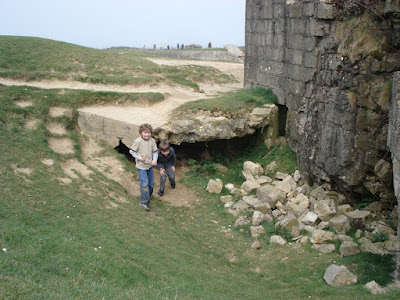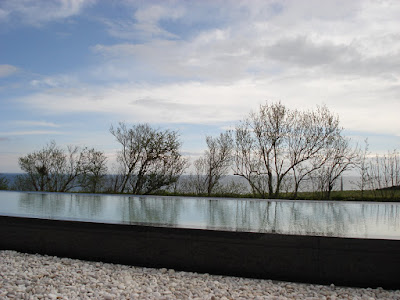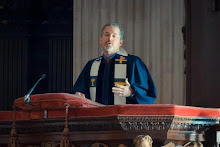John 20:1-18Easter Week brings out all kinds of discussions that don’t happen much during the rest of the year. For one thing, even in this most secular of countries, it’s still called
Easter Week. In the States, which claims to have a much higher proportion of people who attend church or profess the Christian faith—even in the States this has been called ‘Spring Break’ for years.
Now it’s true that even though they still call it Easter here, that name tends to mean bunnies and chocolate and daffodils and brightly colored eggs. Ian woke up to a search for chocolate eggs at our house…
But this past week
The Times of London ran special sections every day discussing different parts of what Easter means, and how it’s affected the culture.
On Monday we saw a retelling of the Crucifixion story, with detail from the latest historical research. One of the articles talked about the value of the Resurrection story—even for those who reject the Christian faith.
On Tuesday there were a handful of articles about modern pilgrimages—journeys that symbolized the impact of the Easter story in the life of an individual or group.
Wednesday and Thursday covered the visual art and music that has been inspired by the Resurrection, with some discussion of how the arts continue to help our experience of the Easter miracle.
Friday’s collection of articles addressed the most important question we face as we think about Easter: What did it all mean? It’s one thing to believe that a resurrection took place—or not—but it’s another thing altogether to talk about why it happened…what was accomplished?
Now we’re going to talk about a handful of things in the next few minutes. We’ll hear one of the Easter accounts from the Scriptures, I’ll try to dazzle you with some illustrations that will help us understand and connect with what we’re celebrating, and I’m going to invite you to wrestle with what God might be trying to communicate to you on this one specific morning.
But before we get to any of that let me just state for the record why we’re here today.
We celebrate Easter to remember the miraculous raising from the dead of Jesus the Messiah—God in human form, who came and lived and served and loved and died in order to demonstrate the depth of God’s love for all of his creation.Now that’s a lot to swallow. If it helps you, this story was just as dramatic and confusing in the 1st century—1700 years before the rise of the modern scientific method—as it is for us today. This is not an easy story. The pastel colors and bunnies and chocolate are all part of our way to get distracted from the shocking, absolutely radical, life-changing story of the resurrection of Jesus the Messiah.
So back to the series of articles in
The Times. In the midst of all those special Easter reports, and without recognizing the connection between the two,
The Times ran a special section on Thursday about surprise endings in movies. Now I love watching movies—sometimes I even get snooty enough about to call them ‘films.’ I don’t like spoiling the twists in movies, but my rule is that if it’s been out more than five years, it’s fair game.
The article in
The Times mentioned 'The Sixth Sense', with Bruce Willis, where it takes him the entire length of the movie to realize that he’s dead.
'Fight Club', which
isn’t for the squeamish, has a shock at the end when Edward Norton realizes that he’s Brad Pitt. That may be a dream for a lot of us…
My favorite, though, is 'The Usual Suspects'. The entire film is really one character telling an enormous lie to deflect suspicion from the fact that he’s in control of everything. When you find out at the end who Kaiser
Soze is, it takes your breath away.
I suppose the mark of a great surprise ending is when you want to go back and see the movie again.
With that in mind, here’s another familiar story with a surprise twist at the end.
1Early on the first day of the week, while it was still dark, Mary Magdalene went to the tomb and saw that the stone had been removed from the entrance. 2So she came running to Simon Peter and the other disciple, the one Jesus loved, and said, "They have taken the Lord out of the tomb, and we don't know where they have put him!"
3So Peter and the other disciple started for the tomb. 4Both were running, but the other disciple outran Peter and reached the tomb first. 5He bent over and looked in at the strips of linen lying there but did not go in. 6Then Simon Peter, who was behind him, arrived and went into the tomb. He saw the strips of linen lying there, 7as well as the burial cloth that had been around Jesus' head. The cloth was folded up by itself, separate from the linen. 8Finally the other disciple, who had reached the tomb first, also went inside. He saw and believed. 9(They still did not understand from Scripture that Jesus had to rise from the dead.)
Jesus Appears to Mary Magdalene
10Then the disciples went back to their homes, 11but Mary stood outside the tomb crying. As she wept, she bent over to look into the tomb 12and saw two angels in white, seated where Jesus' body had been, one at the head and the other at the foot.
13They asked her, "Woman, why are you crying?"
"They have taken my Lord away," she said, "and I don't know where they have put him." 14At this, she turned around and saw Jesus standing there, but she did not realize that it was Jesus.
15"Woman," he said, "why are you crying? Who is it you are looking for?" Thinking he was the gardener, she said, "Sir, if you have carried him away, tell me where you have put him, and I will get him."
16Jesus said to her, "Mary." She turned toward him and cried out in Aramaic, "Rabboni!" (which means Teacher).
17Jesus said, "Do not hold on to me, for I have not yet returned to the Father. Go instead to my brothers and tell them, 'I am returning to my Father and your Father, to my God and your God.' "
18Mary Magdalene went to the disciples with the news: "I have seen the Lord!" And she told them that he had said these things to her.
What a great telling of the resurrection story. Mary Magdalene and a few of the disciples go to the place where Jesus had been buried, and they panic when they can’t find him. They assume the body has been stolen. The disciples go back to their house, but Mary stays there, weeping, devastated by the events of the last week. Jesus came into Jerusalem with such promise, but she watched him arrested, beaten, crucified and buried. And now to top it off, someone has stolen the body.
Mary’s so distraught that even when the risen Jesus comes to comfort her, she mistakes him for the gardener. When she sees who he is, she runs back to the disciples with the good news: ‘I have seen the Lord!’
Over the past six weeks we’
ve been talking about how the Atonement—what Jesus the Messiah accomplished in his death and resurrection—how the Atonement heals the relationships God made for us to enjoy. How God calls us back to him through Christ to wholeness and contentment and peace and love—what the Bible calls ‘Shalom.’
The resurrection of Jesus is the high point of that story. It’s where we see God not only pay a price for us, but also where he shows that he has power over the thing we fear most. The resurrection shows that God has power even over death.
Now it should be clear by now that this is one of the Sundays in the year where we don’t try to make everything rational or logical—we don’t try to explain the science behind the resurrection of Jesus. This is a 100% miracle—a miracle that defines and gives shape to our faith and our hope. From top to bottom it is the work of God, interfering with history—interfering with processes we think we understand and try to control. On this one Sunday of the year—we’re here to talk about and to celebrate a miracle.
Most people
wouldn’t recognize the name
Witold Pilecki. I had no idea who he was until I read an article about him last month.
Pilecki was a resistance fighter in Poland during the Second World War. In order to get evidence of what was happening in the concentration camps, he changed his identity and made himself Jewish, so he would be arrested. Can you imagine? He ended up in Auschwitz, and wrote a full report of what he saw there. He escaped and smuggled the report to London, where it was passed along to the Allied leadership.
Who would do such a thing? Who would willingly take on another identity—a dangerous identity—in order to help others who were doomed to death?
Let’s review again why we’re here today.
We celebrate Easter to remember the miraculous raising from the dead of Jesus the Messiah—God in human form, who came and lived and served and loved and died in order to demonstrate the depth of God’s love for all of his creation.But so much of the world seems to be going crazy these days. Between the economy and earthquakes and pirates on the high seas and the tragedies that touch all of our lives… So much of the world seems as though it
hasn’t been touched at all by the Resurrection of Jesus.
Tomorrow morning, Julie, Ian and I are going to Normandy for the first time. I’
ve been an avid reader of WWII history since I was a kid, and I’m excited about seeing the landing sites in person. It’s hard to grasp how huge the invasion really was.
On D-Day, the Allies landed around 156,000 troops in Normandy. That’s on the first day alone.
On D-Day, Allied aircraft flew 14,674 individual flights
By the end of 11 June (D + 5), 326,547 troops, 54,186 vehicles and more than 100,000 tons of supplies had been landed on the beaches.
The D-Day invasion was an amazing achievement—the Allies were desperate to open a second front against Nazi Germany, but in order to do that you had to get an army onto land in Europe—an army that was ready to fight and win.
Of course we know that WWII
didn’t end in June of 1944, but in was clear that the tide of the war had turned when the Normandy landings were successful. There was still an enormous amount of fighting to do—the Battle of the Bulge, the failed invasion of Holland, the street fighting in Berlin—all of these came after D-Day. But once the Allies were able to put an army in France, the outcome of the war was assured.
Easter is the D-Day moment in the Bible. The tide of the war has turned—the Messiah that God promised has come.
He loved and taught and modeled for us what God is like.
He healed and comforted and showed us how God made us to live.
He suffered and died to cover the worst of how we reject God’s love.
He rose again to show that even death
couldn’t separate us from the God who made us and loves us.
But none of that means the job is completed. There’s still some work yet to do.
There is still suffering to care for and to prevent.
There is still injustice and oppression to stand up against in God’s name.
There is still an earth to protect and tend so that all of God’s people can enjoy its fruit.
There are still people who haven’t seen or heard a credible version of the Gospel.
There is still plenty of work to do. Most of the world still
hasn’t experienced the blessing of the resurrection of Jesus the Messiah. D-Day may have already happened—the decisive battle may have already been won, but there is still plenty of work to do.
And on top of that, the resurrection is still a hard concept for us to grasp. It can be an overwhelming challenge for us to think of God intervening in history—interfering in the way we understand how the world works. It’s hard sometimes to say that we believe—that we have faith in something that other people struggle with or completely reject.
Remember the book, ‘All I ever needed to know I learned in Kindergarten’? The author tried to sum up the really important lessons of life using the things he learned in school when he was five years old.
When it comes to having faith in the miracle of the resurrection of Jesus, I think that most of what we need to know we learn from the
pre-flight instructions we hear every time we get on a plane. After pointing out the emergency exits, the attendant will say: ‘In the unlikely event of a drop in cabin pressure, a mask will drop down in front of you. Give it a tug to begin the flow of oxygen. Place your own mask on first before helping those around you.’
On this Easter Day let me invite you to take hold of the resurrection miracle for yourself. There’ll be time to worry about whether or not your neighbor—or the rest of the world—believes it along with you. Take a hold of this story and let it begin to give you life—to change your life.
Because that’s the point of the Easter miracle. It changes everything. Listen to how Tom Wright describes it in his book,
Simply Christian.
‘When Jesus emerged from the tomb, justice, spirituality, relationships and beauty rose with him. Something has happened in and through Jesus as a result of which the world is a different place, a place where heaven and earth have been joined forever. God’s future has arrived in the present. Instead of mere echoes, we hear the voice of God itself: a voice which speaks of rescue from evil and death. A voice that speaks of new creation.’
We celebrate Easter to remember the miraculous raising from the dead of Jesus the Messiah—God in human form, who came and lived and served and loved and died in order to demonstrate the depth of God’s love for all of his creation.
That may end up being the biggest surprise twist ending of them all. The one who came and served and suffered and died—the one we call Jesus was raised from the dead. And nothing, nothing will ever be the same again.
How great—how amazing—how deep the Father’s love for us. Amen.
 The grounds at the inn, which is a converted 13th century monastery.
The grounds at the inn, which is a converted 13th century monastery. Our breakfast spread. The light green eggs are from the ducks at the inn, and they were delicious.
Our breakfast spread. The light green eggs are from the ducks at the inn, and they were delicious. Ian having a pensive moment looking out onto the grounds.
Ian having a pensive moment looking out onto the grounds. Enjoying another great breakfast.
Enjoying another great breakfast. Sunset from our window.
Sunset from our window. If you're not familiar with the story of Pointe du Hoc, it's worth looking up. There were some big guns up there that had a clear view of the Omaha and Utah landing sites. They were heavily fortified in concrete bunkers and protected on the ocean side by steep cliffs. They were pounded from the air for weeks before the landings, but couldn't be destroyed. When it was proposed that a unit try to disable the guns on D-Day, the majority of the planners said it couldn't be done. On 6 June group of 225 US Rangers landed on the beach under heavy fire, climbed the cliffs and took the hill. Only 90 survived. As it turned out the guns had been moved, but the Rangers found them later and destroyed them.
If you're not familiar with the story of Pointe du Hoc, it's worth looking up. There were some big guns up there that had a clear view of the Omaha and Utah landing sites. They were heavily fortified in concrete bunkers and protected on the ocean side by steep cliffs. They were pounded from the air for weeks before the landings, but couldn't be destroyed. When it was proposed that a unit try to disable the guns on D-Day, the majority of the planners said it couldn't be done. On 6 June group of 225 US Rangers landed on the beach under heavy fire, climbed the cliffs and took the hill. Only 90 survived. As it turned out the guns had been moved, but the Rangers found them later and destroyed them. The cratered landscape of Pointe du Hoc. Some of the holes are 20 feet deep and even wider across. When the Rangers got to the top, their reconnaissance maps were useless because the terrain had been so radically altered.
The cratered landscape of Pointe du Hoc. Some of the holes are 20 feet deep and even wider across. When the Rangers got to the top, their reconnaissance maps were useless because the terrain had been so radically altered.

 On the boat, with Omaha Beach in the background.
On the boat, with Omaha Beach in the background.
 A fountain memorial at the Cemetery.
A fountain memorial at the Cemetery.
 Standing with Julie and Ian on Omaha Beach.
Standing with Julie and Ian on Omaha Beach.